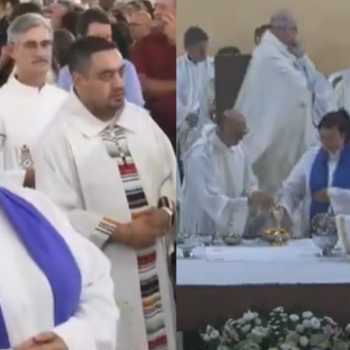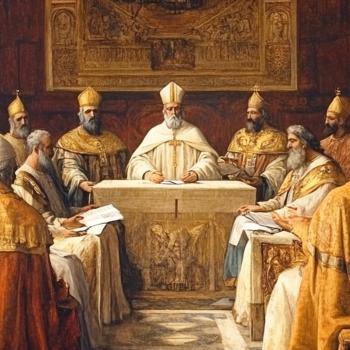Editor's Note: Below is a "Monday Sermon," from our series of sermons at the Patheos Preachers Portal that pastors can enjoy and learn from. It is our hope that this particular series from Daniel Harrell, which preaches through the Church Fathers, will encourage pastors, show them a way of approaching theological education from the pulpit, and refresh their theological memories. See Reverend Harrell's columnist page for more information.
Each year, a parent of a freshman college student will call our church concerned that their child is spending too much time here at Park Street Church. The conversation usually goes something like this: "There's worship on Sunday, Bible study on Tuesday, a service group on Thursday, and then a social outing on Saturday. And most of their friends come from your church too. Are you a cult?"
This always strikes me as an odd question to ask, since no self-respecting cult would ever admit to it. Consequently, I am tempted to answer, "As a matter of fact, we are a cult!" But knowing that solace works better than sarcasm for parents who worry that their child has converted to some strange religion, I instead respond that "no, we're just a congregational church full of Type-A achievers who tend to over-commit. But don't worry, everyone is allowed to come and go as they please and we don't raise money at airports."
But then I add, "We do believe in a God we can't see who exists as three persons with one nature having manifested himself as a random Jewish carpenter with two natures who then died and rose from the dead promising one day to come back to earth and usher those who believe all of this into everlasting glory. But of course, there's nothing strange about that."
Had there been telephones in the third century, a particularly affluent ancient Turkish mother would have called somebody about her son, Theodore. Having saved up for his education since the day he was born, Theodore's parents were surely delighted when he decided to attend law school in Palestine. However, once Theodore got there, he enrolled in a class taught by the renowned early Christian theologian, Origen. Persuaded by Origen's arguments on behalf of the gospel, Theodore dropped out of law school and converted from paganism to Christianity. And as if changing his religion wasn't bad enough, Theodore also changed his name to Gregory (which means one who watches).
Upon his return to Asia Minor, Gregory then became a bishop (which means one who watches over); in his case the bishop of a tiny church-plant of 17 people in his hometown. Basically, Gregory gave up a lucrative law career to be a small-group leader with a fancy hat. Talk about shocking the parents.
We know Gregory today by the surname Thaumaturgus—Greek for wonder-worker—a surname given mostly to distinguish this Gregory from all the other famous Gregories in church history (Nazianzus, Nyssa and the Great). A number of miraculous wonders were attributed to Gregory, however historians generally treat these as legends manufactured by an adoring congregation who loved his preaching and leadership.
One tale has Gregory arbitrating a dispute between two brothers over the ownership of a lake. Frustrated with this quarrel regarding a body of water big enough to share, Gregory split the lake into half, creating two smaller ponds so that neither brother got what he wanted. Clearly somebody had been reading about King Solomon. But parting water actually earned Gregory the nickname Moses, though again, it is very doubtful he pulled it off.
Yet it is true that Gregory devoted much of his practical writing to property disputes. Apparently the earliest-church practice of holding everything in common had by the third century given ground back to basic greed. This prompted Gregory to write,
Covetousness is a great evil, and it is not possible in a single letter to set forth those scriptures in which not robbery alone is declared to be a horrible thing and abhorred, but instead the grasping mind, and the disposition to meddle with what belongs to others, in order to satisfy the sordid love of gain. All persons of that spirit are excommunicated from the Church of God. For as Scripture says, 'No immoral, impure or covetous person has any inheritance in the kingdom of Christ and of God' (Ephesians 5:5).
Covetousness, in addition to being a direct violation of the Tenth Commandment, also violated the Christian community ethic. For a people redeemed as the unified body of Christ, to want for yourself what is not yours to want only tears the body apart.





